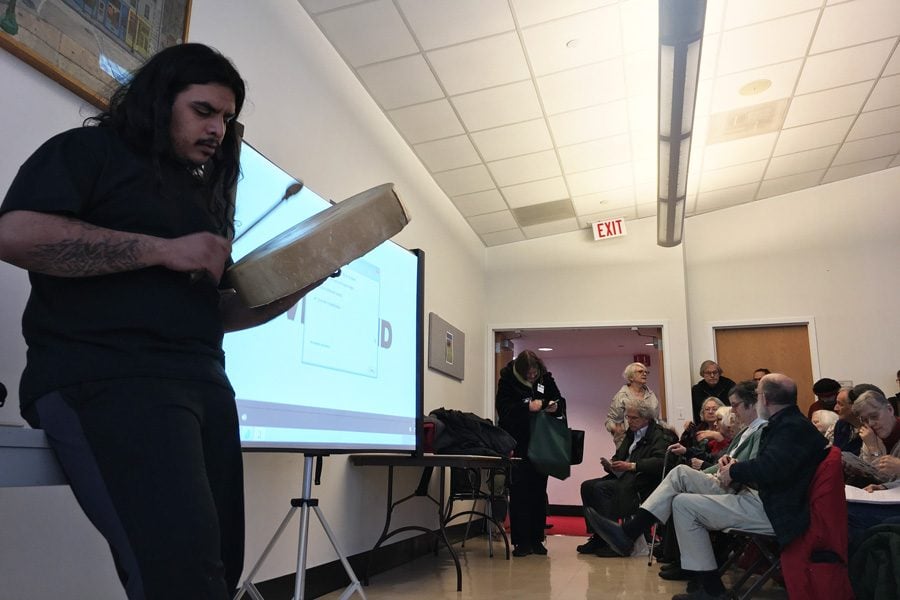Local activists urge community to do their part to actively oppose Dakota Access Pipeline
Syd Stone/The Daily Northwestern
Efrain Montalvo, a cultural liaison at the Chicago chapter of the International Indigenous Youth Council, at an event hosted by Evanston Public Library. The event included a discussion about the latest developments on the Dakota Access Pipeline in North Dakota and Illinois, as well as issues of Native American sovereignty.
February 26, 2017
Organizers urged Evanston community members to divest from banks that support the Dakota Access Pipeline and to stand in solidarity with individuals who could be affected by the pipeline’s construction at an event Saturday.
Local indigenous community organizers spoke to a crowd of about 70 people at the Evanston Levy Center, 300 Dodge Ave., at an event hosted by Evanston Public Library. Organizers first showed clips from the Vice documentary “Sacred Water: Standing Rock,” which addressed the current construction of the Dakota Access Pipeline in southern Illinois. The event was also sponsored by Neighbors for Peace, a community group dedicated to exploring peaceful solutions, Evanston Documentary Film Group, and Occupy Evanston, the city’s branch of Occupy Wall Street.
Following the video, speakers led a discussion about the latest developments in North Dakota and Illinois, as well as issues of Native American sovereignty. President Donald Trump recently approved construction of the pipeline after it had been blocked by President Barack Obama.
David Bender, a member of the Standing Rock Lakota and the Bad River band of Ojibwe in Northern Wisconsin, spoke about the reasoning behind the #NoDAPL movement.
“We’re fighting for the water, we’re fighting for the earth and we’re fighting for each other,” said Bender, a community organizer of the American Indian Center Chicago.
Bender said people do not have to be on the “front lines” of Standing Rock to make an impact on the movement. He said divesting from banks that finance the pipeline is one way to help remotely.
Other speakers emphasized that the fight against the pipeline is tied to protecting Native lands. Efrain Montalvo, a cultural liaison at the Chicago chapter of the International Indigenous Youth Council, urged the audience to invest themselves in caring for the planet.
“Everything that we have now is not for us,” he said. “We have to protect it because we are not the sole proprietors of the resources, our children are. If we can’t collectively take care of these things, we have failed our future generations.”
Iztac Metztli, also a member of the Chicago chapter of the International Indigenous Youth Council, said she aims to organize ways for youth returning to Chicago from Standing Rock to cope with everything they witnessed while there.
Chicago activist Andrea Perkins, a member of the Chinook and Haida Nations, said the camps housing pipeline workers can be especially dangerous for women and children.
“Our communities are being affected by this pipeline because outside forces are coming in with poisons like drugs and alcohol and ‘man camps,’” she said. “They target indigenous women.”
Bender encouraged solidarity with the movement through shared experiences of needing natural resources for survival.
“What brings us here today is the feeling that we’re all connected,” he said. “We are connected by the water, and that’s why we say water is sacred.”
Email: [email protected]
Twitter: @SydStone16


